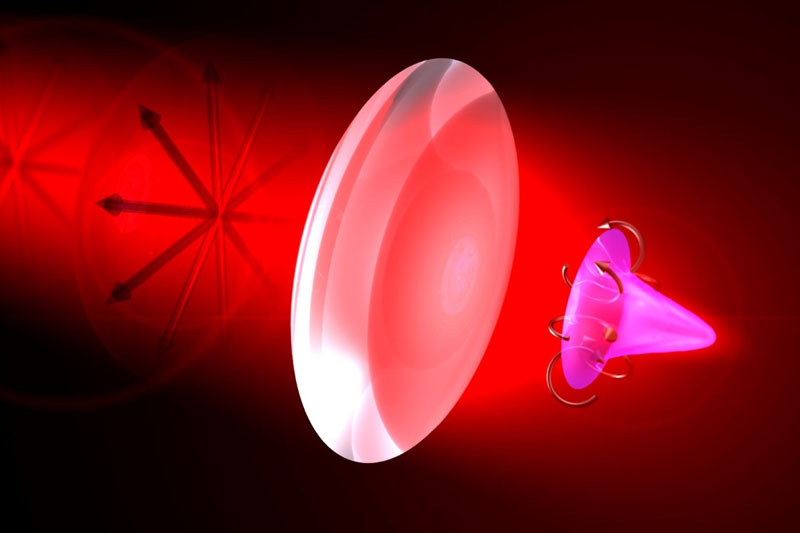One of the most intriguing features of electromagnetic waves in general and light in particular is their polarization. It defines how the electric field component of an electromagnetic wave is oriented and changes with time. If the electric field oscillates in a fixed plane, the wave is said to be linearly polarized while a field spinning about an axis – usually the propagation direction of the light wave – is circularly or elliptically polarized. The rotational dynamics of elliptically or circularly polarized light also give rise to an intimately related property, the so-called spin (angular momentum). Just like the propeller of an airplane, also the spinning electric field of light carries angular momentum. Naturally and quite intuitively, if light is totally unpolarised, just like the light coming from a light bulb or LED, the polarization is not defined and also its spin should vanish.
About a decade ago, members of the aforementioned international teams and their co-workers discovered that light might also behave like a spinning wheel, i.e., the angular momentum can be orthogonal to the propagation direction of a light wave with the field spinning in the propagation plane, just like the spokes of a wheel. Originally considered as an exotic and exclusive phenomenon, it was shown by the authors and their colleagues that this feature of so-called transverse spin is a ubiquitous feature arsing in various schemes involving spatial confinement of light.
In a collaborative project, the groups from Austria, Germany, the UK, Japan, France and the US now brought together these two concepts of unpolarized light and transverse spin in two conceptually quite different experiments and a unified theoretical framework. Counter-intuitively they showed that fully unpolarised light beams can be polarized circularly – and therefore also feature non-zero (transverse) spin – by spatial confinement. This is a remarkable finding because it would allow for polarizing light and making it spin by, e.g., simple focusing, which seems to contradict the simple and established understanding of spin and polarization of unpolarised light. Key to this discovery is the intricate structure of light at micro- and nanoscale and the ubiquity of transverse spin.
The results of this study are discussed in an article published recently in Nature Photonics (https://doi.org/10.1038/s41566-020-00733-3). This international collaboration sheds new light on the properties of unpolarized waves and fields, opening up a whole new avenue for the implementation of polarization-sensitive experiments in various areas of optics.
J. S. Eismann, L. H. Nicholls, D. J. Roth, M. A. Alonso, P. Banzer, F. J. Rodríguez-Fortuño, A. V. Zayats, F. Nori & K. Y. Bliokh, „Transverse spinning of unpolarized light“, Nature Photonics (2020)
https://doi.org/10.1038/s41566-020-00733-3
Nature Photonics News & Views:
https://www.nature.com/articles/s41566-020-00756-w
News article on PhysicsWorld:
https://physicsworld.com/a/spin-in-unpolarized-light-defies-conventional-picture/
Contact: Peter Banzer; Optics of Nano and Quantum Materials (website)
